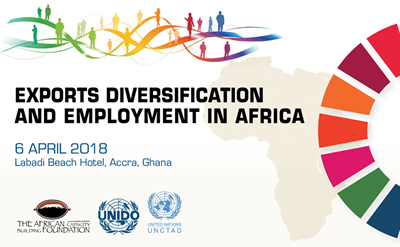With Africa's working-age population growing rapidly and new workers entering the labour force, new jobs will need to be created to avoid a future increase in total unemployment rates.
And although Africa has experienced relatively strong trade and output growth, this has not led to significant employment creation.
To tackle this major development challenge for Africa, Experts gathered in Accra, Ghana on 6 April at a meeting organized by UNCTAD and the Africa Capacity Building Foundation.
Participants examined how export diversification can strengthen the links between the economic growth and job creation.
"There is a pressing need for Africa to harness its growing export sector and translate this success into new jobs and diversified productive activities" said Patrick Osakwe, Head of the Trade and Poverty Branch at UNCTAD. Mr. Osakwe also said that the nature and pattern of diversification ultimately determine the net impact on employment.
Panelists at the event, the Expert Meeting on Exports Diversification and Employment in Africa, debated the ways and means available to African policymakers to translate future economic growth and export diversification into more and better jobs in Africa.
They said that employment services, skills development and targeted labour market training - with a special emphasis on technical and vocational education - would help.
Dr. Assefa Admassie, Research Fellow at Ethiopia Economic Association said that the Asian experience on diversification provides useful lessons for Africa but it is unlikely to be replicated in Africa because the external economic environment has changed significantly.
More and better jobs
Policies could also take on a sectoral dimension.
Employment opportunities can arise in key industries such as agriculture, agro-industry and the growing services sector as exports of African agricultural and value-added agro-industrial products grow.
Panellists said that African policymakers need to develop programmes to support enterprise and entrepreneurship development, and business development services. They also need to draw lessons from the experiences of successful developing countries in other regions.
The session was moderated by Patrick Osakwe, and featured panelists included:
Prof. Augustin FOSU, Institute of Statistical, Social and Economic Research, University of Ghana
Ms. Amelia U. SANTOS-PAULINO, Economic Affairs Officer, Trade and Poverty Branch, UNCTAD, Geneva
Mr. Mussie DELELEGN, Chief, Landlocked Developing Countries Section, Trade and Poverty Branch, UNCTAD, Geneva
Mr. Yao GRAHAM, Coordinator, Third World Network-Africa, Ghana
Prof. Ebere ONWUDIWE, Chairman, O-analytics Research and Development Initiative (ORADI), Abuja, Nigeria
Mr. Philip. R. WOOD, Regional Advisor, International Monetary Fund - Regional Technical Assistance Center, Ghana
and more than 100 African policymakers, international development partners, academics, and members of civil society participated in the event.
It was organized as a side event of the 2018 AFRICA Think Tank Summit on Tackling Africa's Youth Unemployment Challenge: Innovative Solutions from the Think Tanks.
The objective of the summit, held 5-7 April, was to promote knowledge-sharing, and identify networking and collaboration opportunities among researchers, policymakers and practitioners.



